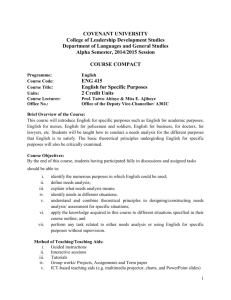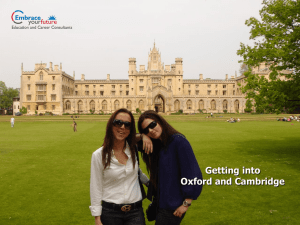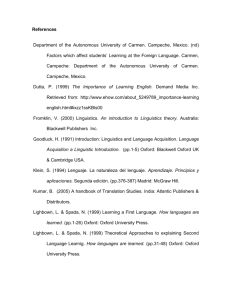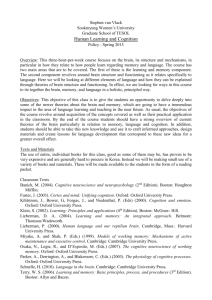DEPARTMENT OF POLITICAL SCIENCE
advertisement
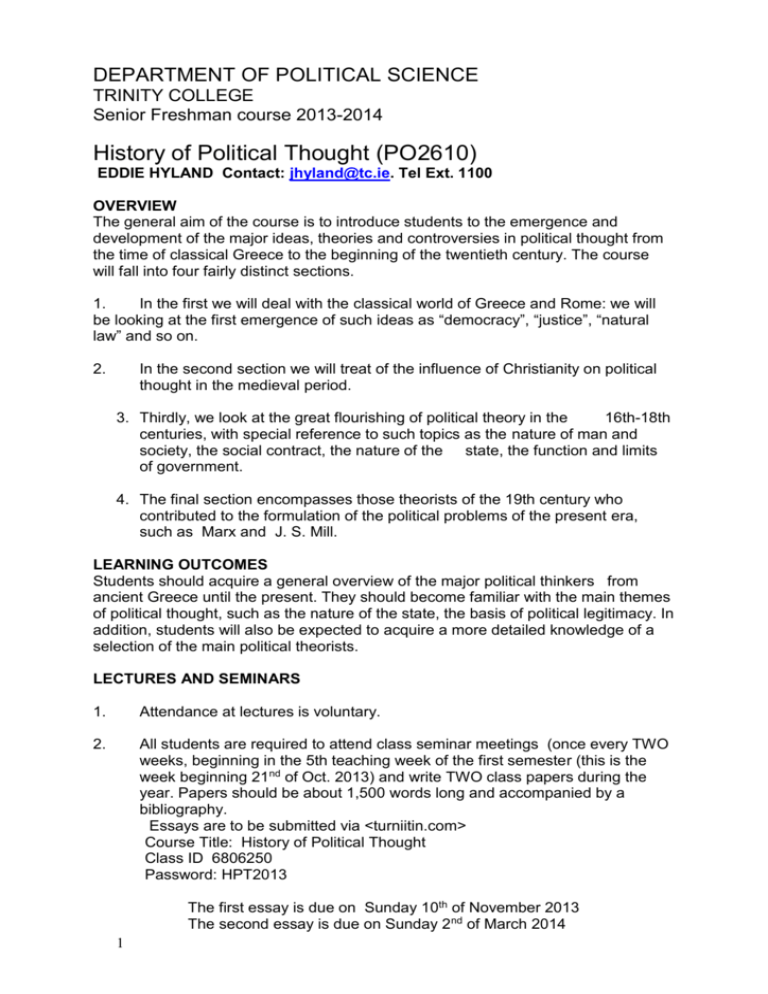
DEPARTMENT OF POLITICAL SCIENCE TRINITY COLLEGE Senior Freshman course 2013-2014 History of Political Thought (PO2610) EDDIE HYLAND Contact: jhyland@tc.ie. Tel Ext. 1100 OVERVIEW The general aim of the course is to introduce students to the emergence and development of the major ideas, theories and controversies in political thought from the time of classical Greece to the beginning of the twentieth century. The course will fall into four fairly distinct sections. 1. In the first we will deal with the classical world of Greece and Rome: we will be looking at the first emergence of such ideas as “democracy”, “justice”, “natural law” and so on. 2. In the second section we will treat of the influence of Christianity on political thought in the medieval period. 3. Thirdly, we look at the great flourishing of political theory in the 16th-18th centuries, with special reference to such topics as the nature of man and society, the social contract, the nature of the state, the function and limits of government. 4. The final section encompasses those theorists of the 19th century who contributed to the formulation of the political problems of the present era, such as Marx and J. S. Mill. LEARNING OUTCOMES Students should acquire a general overview of the major political thinkers from ancient Greece until the present. They should become familiar with the main themes of political thought, such as the nature of the state, the basis of political legitimacy. In addition, students will also be expected to acquire a more detailed knowledge of a selection of the main political theorists. LECTURES AND SEMINARS 1. Attendance at lectures is voluntary. 2. All students are required to attend class seminar meetings (once every TWO weeks, beginning in the 5th teaching week of the first semester (this is the week beginning 21nd of Oct. 2013) and write TWO class papers during the year. Papers should be about 1,500 words long and accompanied by a bibliography. Essays are to be submitted via <turniitin.com> Course Title: History of Political Thought Class ID 6806250 Password: HPT2013 The first essay is due on Sunday 10th of November 2013 The second essay is due on Sunday 2nd of March 2014 1 The two essays together count for 25% of the overall grade for the year. 3. There is an annual examination at the end of the academic year taken by all full-year two semester students. 4. One Semester students do not sit an examination. They are assessed on the basis of TWO essays, the first submitted at the end of the study week in the semester that they are at TCD and the second at the end of that semester. Dr Hyland has office hours between 10.00-11 am, on Tuesdays, during teaching term in room 4.05, College Green GENERAL READING GUIDE A. Books that provide selections from primary texts 1. Masters of Political Thought (three volumes) edited by M. B. Foster, W. T. Jones and L. W. Lancaster. These books contain a good selection of quite long extracts from the classic works of political theory ranging from the pre-Platonic period to Marx. They also contain useful commentaries by the editors on the texts quoted. s. 2. Some interesting and important selections from primary texts which are not included in the Masters series can be found in Western Political Heritage by W. Y. Elliot and N. A. MacDonald (Prentice Hall, 1963) 3. Classical Political Theories: From Plato to Marx, (ed), Robert Brown (London 1990). B. 4. Classics of Moral and Political Theory, Michael L. Morgan (ed.), Hackett Publishing Company, Indianapolis (Cambridge,1992). (This is an excellent collection of , in many cases, the complete texts of the relevant political thinkers) Commentaries 1. W. T. Bluhm, Theories of the Political System, a good attempt at demonstrating the relevance of certain classic political theories to contemporary political problems (Prentice Hall, 1965). 2. G. H. Sabine, A History of Political Theory, standard textbook. It gives a good survey of political thought (N.Y., 1961). 3. S. S. Wolin, Politics and Vision, consists of a series of sophisticated interpretative essays. A serious work, well worth close study. (Little, Brown and Co., 1960). 4. J. Plamenatz, Man and Society (two volumes) provides a good critical analysis of modern political theories of Machiavelli to Marx. (Longman, London, 1970). 5. L. J. Macfarlane, Modern Political Theory (Nelson, London, 1970). 6. D. Thomson, Political Ideas (Penguin Books, 1970) 2 7. R. N. Berki, History of Political Theory (Dent, 1976) 8. E. Wood and N. Wood, Class Ideology and Ancient Political Theory (Oxford, 1978) 9. M. Forsyth and M. Keens-Soper (eds.), A Guide to the Political Classics: Plato to Rousseau (Oxford, 1988). 10. Brian Redhead, From Plato to Nato (BBC publications) 11. Iain Hampsher-Monk, A History of Modern Political Thought,( Basil Blackwell, 1992.)*** 12. Edward Bryan Portis, Reconstructing the Classics: Political Theory from Plato to Marx, (N. Jersey, 1994). 13. J. S. McClelland, A History of Western Political Thought, (London, 1996)*** 14. Janet Coleman, A History of Political Thought, Vols. I and II (Oxford, 2000) 15. David Boucher and Paul Kelly, Political Thinkers From Socrates to the Present(Oxford. 2003) *** 16. Alan Ryan, On Politics; A History of Political Thought from Herodotus to the Present (London, 2012)This is a recently published (very large) book that is written in a very engaging and accessible style that is not afraid to relate thinkers both to their historical contexts and to other thinkers in the history of political thought. It also contains an excellent guide to further reading. 17. John Rawls, Lectures on the History of Political Philosophy (Harvard, 2007) – a very sympathetic and close reading of political theorists from Hobbes to Marx by one of the great political theorists of the 20th century 18. Joseph M. Bryant, Moral codes and social structure in ancient Greece (New York, 1996) – a sophisticated work containing material relevant to Athenian democracy, Plato, Aristotle, Epicureanism and Stoicism Students’ attention is drawn to the series Great Political Thinkers published by Edward Elgar, Cheltenham. There are volumes on most of the great political theorists and each contains an extensive collection of the most important writings on each political theorist. Oxford University Press also publishes a “very short introduction” series covering most of the political theorists that we deal with. Details can be found in the Alan Ryan book mentioned above. C. Monographs Unwin University Books publish a series of monographs on the major political thinkers. The ones so far available are: 1. 2. 3. 3 J. B. Morrall, Aristotle (1977) R. Plant, Hegel (1972) M. Evans, Marx (1972) 4. 5. 6. 7. 8. 9. 10. F. O’Gorman, Burke (1974) R. J. Halliday, John Stuart Mill (1972) J. Steintrager, Bentham (1977) D. D. Raphael, Hobbes (1977) G. Parry, Locke (1977) R. W. Hall, Plato (1982) Two recently published books are of relevance as background to ancient Greek political thought, they are: Polis: An Introduction to the Ancient Greek City-State, Mogens Hansen, (Oxford. 2006) and Ancient Greek Political Thought in Practice. Paul Cartledge, ( Cambridge, 2009) D. Oxford University Press publish a series, Past Masters, containing volumes on Aristotle, Plato, Machiavelli, Marx and Hegel. These books are short, readable and readily available. They are excellent introductions to their subject. E. The bi-annual journal History of Political Thought, published since 1980, contains many important articles on all the political thinkers covered in the course. F. STUDENTS’ ATTENTION IS DRAWN to The Stanford Encyclopedia of Philosophy, there are entries on ALL the political theorists covered in the course. They are of an EXCELLENT standard and have in addition a very comprehensive and up-to-date extra bibliography. THIS IS AVAILABLE FREE ON-LINE.*** *** ITEMS ARE RECOMMENDED AS REALLY GOOD INTRODUCTORY OVERVIEWS. Seminar and essay topics HOW TO APPROACH READING FOR SPECIFIC TOPICS. In general I have not placed chapters from the historical overview books on the specialised bibliography for each topic, BUT THE BEST WAY TO START READING for a specific area is to read the relevant section of, for example, The Masters of Political Thought, the entry in The Stanford Encyclopedia and the relevant chapter from the J S McLelland book and/or Political Thinkers from Socrates to The Present. The other overview books for specific periods could also be consulted. Such as the Cambridge Companion series, Plamenatz’s Man and Society or Hampsher-Monk’s A History of Modern Political Though 1. Was Athenian ‘demokratia’ democratic in the modern sense of the term? a) b) c) d) e) f) g) h) 4 M. H. Hansen, Was Athens a Democracy (Copenhagen, 1989) A.H.M. Jones, Athenian Democracy (Oxford, 1975) M.I. Finley, Democracy, Ancient and Modern (London, 1969) D. Held, Models of Democracy (London,1987) Ch. 1 G. Sartori, Democratic Theory (New York, 1965) M. H. Hansen, The Athenian Democracy in the Age of Demosthenes (Oxford, 1992) J. Dunn (ed.), Democracy: the unfinished journey (Oxford, 1992) G. C. Field, Political Theory (London, 1965) Final Chapter i) J. Ober and C Hedrick (eds) Demokratia: a conversation on democracies ancient and modern (Princeton, 1996) esp. Introduction and Part One ‘Liberty, equality and law’ NOTE 1: There is a VERY VALUABLE website relevant to Athenian Democracy available at: Demos; Classical Athenian Democracy, it contains extensive material relevant to all aspects of Athenian Democracy. NOTE 2: If you are having difficulties accessing the Jones book most of the chapters are available as separate articles: ‘The Economic Basis of Athenian democracy’, Past and Present I (1952); ‘The Athenian Democracy and Its Critics’, Cambridge Historical Journal, 13, (1953); ‘The Social Structure Of Athens in the Fourth Century BC’, Economic History Review, 8 (1955). All these are accessible through JStorr Students choosing to do their essay on this topic might like to look at some readings that discuss the modern concept of democracy such as R. Dahl, On Democracy, (New Haven, 1998) or J L Hyland, Democratic Theory : The philosophical foundations. Ch 3( Manchester ,1995) 2. Is ‘justice’ anything more than a tool used by the strong to oppress the weak? a) Plato, The Republic, book 1(Oxford, 1978) b) J. Annas, An introduction to Plato’s Republic, (Oxford: 1981) c) G. Klosko, The development of Plato’s political theory (London: 1986), ch. 1 d) R. C Cross and W D Woozley, Plato’s Republic (London: 1979), ch. 2 e) T. Y. Henderson, “In defence of Thrasymachus”, American philosophical quarterly, vol. 7, no. 3 (1970), pp. 218-228. On photocopy reserve. f) I. Dilman, Morality and the inner life (London: 1979), chs 6 and 7 3. Why, according to Plato, should only philosophers rule? a) Plato, The Republic (Oxford, 1978 ) b) G. Klosko, The development of Plato’s political theory (London: 1986) c) J. Wolff, An introduction to political philosophy (Oxford: 1996), ch 3 d) R. Dahl, Democracy and its critics (Yale: 1989), chs 4 and 5 e) T. L .Thorson (ed), Plato: totalitarian or democrat (New Jersey: 1963) f) C. D. C. Reeve, Philosopher kings (Princeton: 1988) g) The Cambridge History of Greek and Roman Political Thought.(Cambridge,2000) ed. C Rowe and M Schofield, Chs 8 and 10 h) J. Ober, Political Dissent in Democratic Athens,: Intellectual Critics of Popular Rule,(Princeton, 1998) Ch. 4 4. What does Aristotle mean by his thesis that ‘man is a political animal’? a) Aristotle, The Politics.(Cambridge, 1988,) edited by Stephen Everson b) R. G. Mulgan, Aristotle’s political theory (Oxford: 1979) c) J. Barnes, The Cambridge Companion to Aristotle (Cambridge: 1995), esp. ch. by Taylor d) D.Keyt and F. Miller, A Companion to Aristotle’s Politics (Oxford: 1991), chs 1, 4, 5 e) S Marc Cohen, The Four Causes, available @ http://faculty.washington.edu/smcohen/320/4causes.htm f) Jean Roberts, The Routledge Philosophy Guidebook to Aristotle and the Politics, (Routledge, 2009) g) John B Morrall, Aristotle, ( London, 1977 ) 5 h) The Cambridge History of Greek and Roman Political Thought(Cambridge, 2000) ed. C Rowe and M Schofield, pp. 310-20.pp. 344-65, pp. 366-389 i) R. G. Mulgan,’ Aristotle and the value of political participation’ Political Theory, 18(1990) 195-215 5. In what sense, if any, were the Stoics egalitarian political theorists? a) H. Baldry, The Unity of Mankind in Greek Thought Esp. chs. 5 and 6. b) J. McClelland, A History of Western Political Thought, (London, 1996), ch. 5 c) S. S. Wolin, Politics and Vision (Boston 1970), ch. 3 d) A. Erskine, The Hellenistic Stoa; Political Thought and Action (London 1989) e) Malcolm Schofield, “Epicurean and Stoic Political Thought”, in The Cambridge History of Greek and Roman Political Thought, (Cambridge, 2000) f) F. H. Sandbach, The Stoics, (Bristol, 1989) g) J. M. Bryant, Moral Codes and Social Structures in Ancient Greece, (New York, 1996), chs on Epicurus and the Stoics 6. Why, for St Augustine, is the state primarily a remedial institution? a) St Augustine, The Political Writings, ed. by H Paolucci,(Chicago, 1962) b) R. Price, Augustine (London: 1996) c) J.McClelland, A history of Western political thought, ch 6 d) H. Deane, The political and social ideas of St Augustine (Columbia: 1963) e) E.Pagels, Adam, Eve and the serpent (London: 1989), esp. ch 4 and 5 f) R. Martin, ‘The two cities in Augustine’s political philosophy’, Journal of the History of Ideas, 33,(1972) 195-216 g) P. R. L. Brown, ‘Saint Augustine’ in B Smalley, ed., Trends in Medieval Political Thought, (Oxford, 1965) h) G. O’Daly. Augustine’s City of God: A Reader’s Guide.(Oxford, 1999)(This is a detailed overview of Augustine’s City of God, for students who might have a special interest) For readings from St Augustine himself item a) above is excellent. Also, there are extensive citations in the H. Deane book, which is highly recommended. 7. In what way is Natural Law central to Aquinas’ political theory? a) Aquinas, Selected political writings, edited by A P D’Entreves (Oxford: 1954) b) J. Finnis, Aquinas; Moral, Political and Legal Theory (Oxford, 1998) c) D.J. O Connor, Aquinas and natural law d) P. E. Sigmund, St Thomas Aquinas on politics and ethics (New York: 1988) e) N. Kretzmann and E. Stump (eds), The Cambridge Companion to Aquinas, esp. chs. on ethics and politics f) The Cambridge History of Later Medieval Philosophy, (1982) (eds.) N. Kretzman, A. Kenny, J. Pinborg and E. Stump, articles on Aquinas. g) J. P. Canning, A History of Medieval Political Thought 300-1450(1996) Ch. 3 The Sigmund book, in particular, has very apposite selections from Aquinas’ works, including the relevant sections from his Summa Theologia. 8. Does Machiavelli’s political thought subordinate morality to political expediency? a) Machiavelli, The Prince.ed, ed. By Q Skinner and R Price( Cambridge, 1991) 6 b) Q.Skinner, Machiavelli (Oxford: 1981), Now available as: Machiavelli: A very short introduction, (2000) c) D. L. Jensen (ed.), Machiavelli, esp chs. by Croce, Cassirer, Maritain and Meinecke d) J.Shklar, Ordinary Vices (Harvard: 1984), esp. chs. 1 and 4 e) J. Shklar, The Faces of Injustice (Yale:1990) f) C. Cruise-O’Brien, The Suspecting Glance (London: 1972) g) Maurizio Viroli, How to Read Machiavelli.(London, 2008) h) G. Bock, Q. Skinner and M. Viroli, eds. Machiavelli and Republicanism, esp the chs. By Skinner and Viroli. i) I. Berlin, ‘The originality of Machiavelli’ in Against the Current.(Oxford, 1979) 9. Why, for Hobbes, is the desire for power so central to his conception of the ‘natural condition of mankind’, which can only be remedied by the creation of an absolute sovereign? a) Hobbes, Leviathan, ed. by R Tuck(Cambridge 1991) b) P. Springborg,(ed.), The Cambridge companion to Hobbes’s Leviathan,(Cambridge, 2007), esp chs. 4,5 and 7. c) I. Hampsher-Monk, A history of modern political thought (Oxford: 1992) d) T. Sorrell, The Cambridge Companion to Hobbes (Cambridge: 1995), ch. 9 e) J. Hampton, Hobbes and the Social Contract Tradition (Cambridge: 1986) f) J. Dunn, The History of Political Theory and other Essays (Cambridge: 1996), ch. 4 g) C. B. Macpherson, The political theory of possessive individualism.(Oxford,1962) h) T. Sorrel. Hobbes, (1986) i) N. Malcolm, Aspects of Hobbes, (2002) j) R. Tuck, Hobbes: A very short introduction,(Oxford, 2002) k) Stephen Pinker, The Better Angels of Our Nature, Ch.2, pp31-58( Allen Lane, London, 2011) l) N. Warburton, J. Pike and D. Matravers (eds) Reading political philosophy: Machiavelli to Mill (Open University Press, 2000) – chs 2.1 and 2.2 – readings by C.B McPherson and Jean Hampton *** 10. What role do natural rights play in Locke’s account of limited government? a) John Locke, Second Treatise of Government,(Cambridge, 1960) b) I. Hampsher-Monk, A history of modern political thought, ch. 2 c) V. Chappell, The Cambridge companion to Locke, (Cambridge: 1994) d) J. Dunn, Locke, (Oxford: 1985). Available as : Locke: A very short introduction. e) G. Parry, Locke (London 1980) f) R. Ashcraft, Locke’s Two Treatises of Government, ( London, 1987 ) 11. Was Rousseau a ‘dreamer of democracy’? a) J.-J. Rousseau, The Social Contract and Discourses,( London, 1973) b) I. Hampsher-Monk, A history of modern political thought, ch. 4. (Oxford, 1992) c) R. Harrison, Democracy (London: 1993), ch. 4 d) R. Wokler (ed.), Rousseau and liberty (Manchester: 1995), esp. parts 2 and 3 e) J. Miller, Rousseau: dreamer of democracy (Yale: 1984) f) J. L. Talmon, The origins of totalitarian democracy (London, 1966) esp. Introduction and Ch.III. g) P. Riley (ed.) The Cambridge Companion to Rousseau,(Cambridge, 2001) h) J. Cohen, Rousseau; a free community of equals,(Oxford, 2010) i) N.J.H. Dent, Rousseau,(Oxford, 1988) j) M. Viroli, Jean-Jacques Rousseau and the “Well Ordered Society”,(Cambridge, 1984) 7 k) Matthew Simpson, Rousseau: a guide for the perplexed (London, 2007) **** 12. Critically examine Mill’s arguments for maximising individual liberty. a) J S Mill, On Liberty,(Cambridge, 1989) b) J Gray (ed), ‘On liberty’ in focus (London: 1991) esp. chs by Ten, Wollheim, Berlin and Ryan c) I Hampsher-Monk, A history of modern political thought, ch. 8 d) C L Ten, Mill on liberty (Oxford: 1980) e) G Himmelfarb, On liberty and liberalism (New York: 1974). 13. What does Marx mean when he claims that capitalism alienates human beings from their labour? a) Karl Marx, Economic and philosophic manuscripts in D McLellan (ed.) Karl Marx: selected writings (Oxford: 1977) b) R. Schacht, Alienation (New York: 1970) c) I. Meszaros, Marx’s theory of alienation (London: 1970) d) J. Plamenatz, Karl Marx’s philosophy of man (Oxford: 1977). pp. 61-172 e) L. Wilde, ‘The Early Marx’ in Political Thinkers from Socrates to the Present. Eds. D Boucher and P. Kelly, (Oxford, 2003). pp. 404-418 f) Jon Elster. Making Sense of Marx,(Cambridge, 1985) chs. 2 and 9 g) John Rawls, Lectures on the History of Political Philosophy, (Harvard, 2008) pp.354372 8


